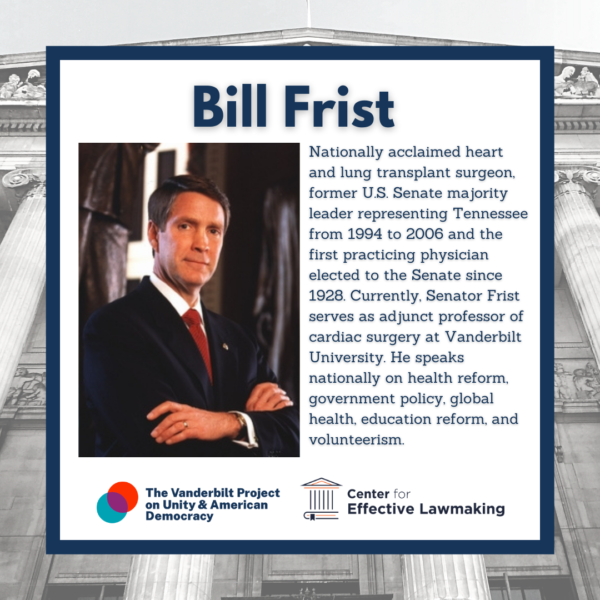Former Senate Majority Leader Dr. Bill Frist shared examples from his time in political office and gave advice on what could help current lawmakers work toward compromise in a recent panel discussion on effective lawmaking.
The virtual discussion, “The Keys to Effective Lawmaking in Turbulent Times,” was Dec. 7, hosted by the Vanderbilt Project on Unity and American Democracy and the Center for Effective Lawmaking.
Frist explained why he believes recent changes in the way Congress operates have sparked greater division. During Frist’s tenure, the Senate needed 60 votes for most major legislation to pass, not the current 50. That meant each party had to take compromise into consideration to pass meaningful legislation.
“If you wanted your legislation to pass, you had to listen to the minority party. You had to talk to them, you had to trade things off and negotiate,” Frist said. “You had to make sure that minority interests were protected and discuss their interests. And that’s simply not true today.”
The panelists also explained how the Center for Effective Lawmaking ranks lawmakers based on their ability to move legislation forward and how voters can see how any elected representative ranks.
MORE ON THE PANELISTS:
Dr. Bill Frist represented Tennessee as a U.S. senator from 1994 to 2006, including as Senate majority leader during his last four years in Congress. Frist helped write health legislation as a member of the Health and Finance committees in the Senate. A nationally acclaimed heart and lung transplant surgeon, he serves as an adjunct professor of cardiac surgery at Vanderbilt University School of Medicine and is co-chair of the Health Project at the Bipartisan Policy Center.
Alan Wiseman is chair of the Vanderbilt political science department and co-director of the Center for Effective Lawmaking. Wiseman focuses his research on the impact of political institutions and lawmakers’ behavior and strategies on overall lawmaking success. He is writing a book on the causes and consequences of legislative effectiveness in the U.S. Congress and studying the emergence and consequences of industry self-regulation in various markets.
Craig Volden, co-director of the Center for Effective Lawmaking, is a professor of public policy and politics, with appointments in the University of Virginia Frank Batten School of Leadership and Public Policy and the Woodrow Wilson Department of Politics. He studies legislative politics and the interaction among political institutions, with a focus on what policy choices arise from legislative–executive relations and from American federalism.
ABOUT THE VANDERBILT PROJECT ON UNITY AND AMERICAN DEMOCRACY
The Vanderbilt Project on Unity and American Democracy is a nonpartisan initiative that aims to elevate research and evidence-based reasoning into the national conversation. Drawing on original research, evidence-based papers and crucial conversations from Vanderbilt’s world-class faculty and visionary thought leaders of all political persuasions, the timely endeavor aims to give policymakers and the public the tools needed to combat conspiracy and unfounded ideology with evidence, data and respectful discourse. The Vanderbilt Project on Unity and American Democracy can make a meaningful contribution to solving society’s most pressing challenges and bridging our deepest differences.
- Visit our NEWS & EVENTS page to view other programs from the Vanderbilt Project on Unity and American Democracy.
- Stay informed on compelling panels, events, news and information from the Vanderbilt Project on Unity and American Democracy through the bi-weekly newsletter, On Unity.